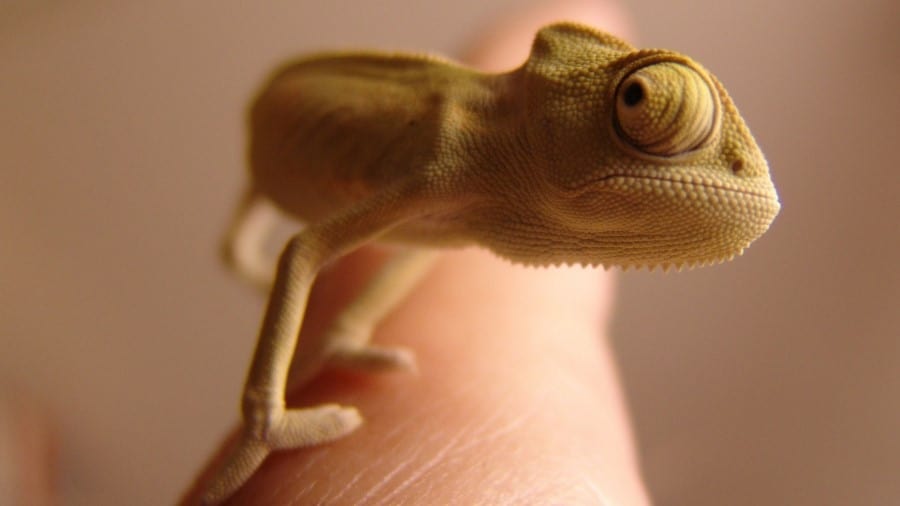
After a long day of work, you’re excited to go back and see your chameleon. You may wonder if chameleons are capable of love, just like me when I first got my cute little lizard friend.
Do chameleons have the capability to form emotional bonds with their owners? Here is what I found out after some research.
No, they are not capable of love as they are reptiles. Reptiles are cold-blooded animals and they don’t have the emotional capability to have affection towards you. But that does not mean they don’t recognize you.
Don’t feel dismayed that your pet chameleon is unable to feel love for you. That is only because reptiles retain their primal instincts even in captivity. They do still have the ability to recognize you though.
Does My Chameleon Love Me?
As mentioned before, chameleons are incapable of developing feelings of affection. They are unable to form clearly defined social groups either.
Chameleons usually see other creatures as a threat. They are very shy creatures who prefer to be alone. This isn’t a feeling exclusively towards humans though. Chameleons tend to freak out when encountering other fellow chameleons as well.
Though your pet chameleon is unable to form an emotional bond with you, it doesn’t mean you can’t do it to them. But if you do insist that you want to emotionally bond with your chameleon, there are some things you can work on.
Domestication
First of all, know that dogs have been domesticated way longer than chameleons have. About 100,000 years longer. Chameleons as pets is a very recent thing happening only about 30 to 40 years ago.
This means that unlike dogs, chameleons are not meant to be pets, nor do they like being pets. Chameleons have not developed such a broad spectrum of emotions like cats or dogs.
Therefore, it is required that you be more careful when handling your chameleon so that they are more comfortable with you.
Instincts
Understanding their basic instincts will help you to understand why they react the way they do. Chameleons tend to keep their instincts, even if they are a captive breed.
This is why you should not be deceived and should stay on alert. Therefore, you should anticipate mood swings now and then.
They can show signs of calmness for a minute and immediately become aggressive the next especially if they are untamed. As mentioned before, keeping chameleons as pets only started very recently.
A few decades of captivity is not enough to erase their fundamental instincts, unlike dogs who have a huge head start.
Trust
Chameleons may not be able to have feelings of love, but they can have feelings of trust. For a chameleon, trust is probably the highest of emotions it can show to you.
Being able to trust their human owners is a very big deal to a chameleon. This means that they no longer see you as a threat or someone they have to avoid at all costs.
They must see your presence as something good. But for that to happen, they must first be able to recognize you.
Way to Make Your Chameleon Recognize You
It’s normal to see a pet dog wag its tail at the sight of their owner, or a cat to rub itself against their owners’ legs as a greeting. But you must be wondering how a chameleon reacts when it sees you.
The information relating to the method of recognition may be overwhelming. Let me walk you through everything together so you can learn a few ways to make your little friend know you more.
Handling Your Chameleon
You must develop your bond with them slowly. Start by doing simple things such as offering food, or occasionally stroking it.
Then when it starts to recognize you, it may show signs of pleasure as a reaction. Make sure you constantly feed them by hand and clean their enclosure yourself.
This is to help them get used to the company and the smell of your hand. The more comfortable they are with your hand, the more likely it is that they will be familiar with you.
Giving them enough personal care during times of illness or discomfort will also help strengthen the bond. However, this doesn’t immediately mean you should be constantly handling it.
Constant handling may cause them to fear you, stressed out, or even become aggressive as it is still not used to you.
That is why during the early stages of familiarity, it is important to keep handing sessions at a minimum. Around 10 to 15 minutes a day is a good starting point.
Gestures Around Your Chameleon
Certain gestures or behaviors also affect how well It recognizes you. Since chameleons will initially see you as a threat, you mustn’t startle it.
Move as slowly and gently when approaching its enclosure. Ensure that it sees you before you reach the cage. This allows them time to process, realizing that something is approaching it.
Also, make sure you don’t flail your arms and legs as it may scare them further. Doing this over a period of time will slowly help your chameleon to recognize you more.
If you had just got your little pet, avoid making direct eye contact for a few days. Looking directly at it when it is not familiar may make it think you are about to eat it!
Wear Chameleon-friendly Colors
The color you wear will also affect their perception of you. Since chameleons express their intentions and emotions through color, it assumes you do too.
Colors that are friendly to them include pale green, khaki, or bland brown. Avoid wearing bright bold colors like pink, black, or red as it may show signs of aggression towards them.
A small thing like this can make a whole world of difference when trying to make a chameleon “love” you.
Being In Control
As mentioned before, chameleons are shy and prefer to be in solitary. They love and need a lot of personal space. Respecting this personal space will help develop your relationship with them.
Giving them enough personal space makes them feel in control. This keeps their mind at ease and also more comfortable in their skin.
Let’s say your chameleon suddenly jerks forward, you should drawback. Or if it straight up ignores you, just walk away from it. Don’t try to touch your chameleon or get close to it in that situation as it might threaten them.
On top of that, you should put your chameleon’s food in their proximity as quickly as possible and leave after. As it watches you while you go on with your daily business, it will slowly start to get used to your presence.
After some time, it will stop seeing you as an immediate threat. This is important especially if your chameleon is a male. Doing this will help you bond with even the most stubborn of chameleons.
Do Different Species of Chameleon Affect How You Bond with Them?
The species of chameleon will also differ from how it sees you. Some species tend to be able to adapt to captivity or handle stress better than others.
Knowing the species of your chameleon can guide you on what to do. Some chameleons make better pets than others. Here are some of the most popular species to look about.
Veiled Chameleons
Veiled chameleons are one of the most popular kinds and extremely common. They can more readily adapt to being in captivity.
Moreover, Veiled chameleons are also more docile with humans and can handle stress better than others. This also makes it the perfect chameleon for beginners.
Panther Chameleons
These beautiful critters tend to be smaller but also incredibly beautiful. Their vivid and bright colors attract people to keep them as pets. But they are very territorial and have a short lifespan so beginners should not consider them.
Jackson’s Chameleons
They are recognized easily by their small horns which resemble a triceratops. They don’t like being handled but can live up to 10 years in captivity.
Oustalet’s Chameleons
These chameleons are huge and can grow up to 30 inches in length through their 12-year lifespan. They are also ideal for people who love handling larger chameleons due to their passive temperament.
Flap-Necked Chameleons
If you like small chameleons, Flap-Necked chameleons are the ones to consider. They are, in fact, one of the smallest breeds of chameleons you can find. Though their ability to cope in captivity is incredible and they are calm, they are not recommended for beginners.
Conclusion
Chameleons are unable to form feelings of affection towards their owners. But this does not mean that they don’t have their unique way of bonding with you.
Being informed on your behavior as well as theirs will help you to understand them more. Make sure you study several different species of chameleon as well.
Even though chameleons can’t love you, they are amazing pets to keep around you, so do your best to keep them happy!


